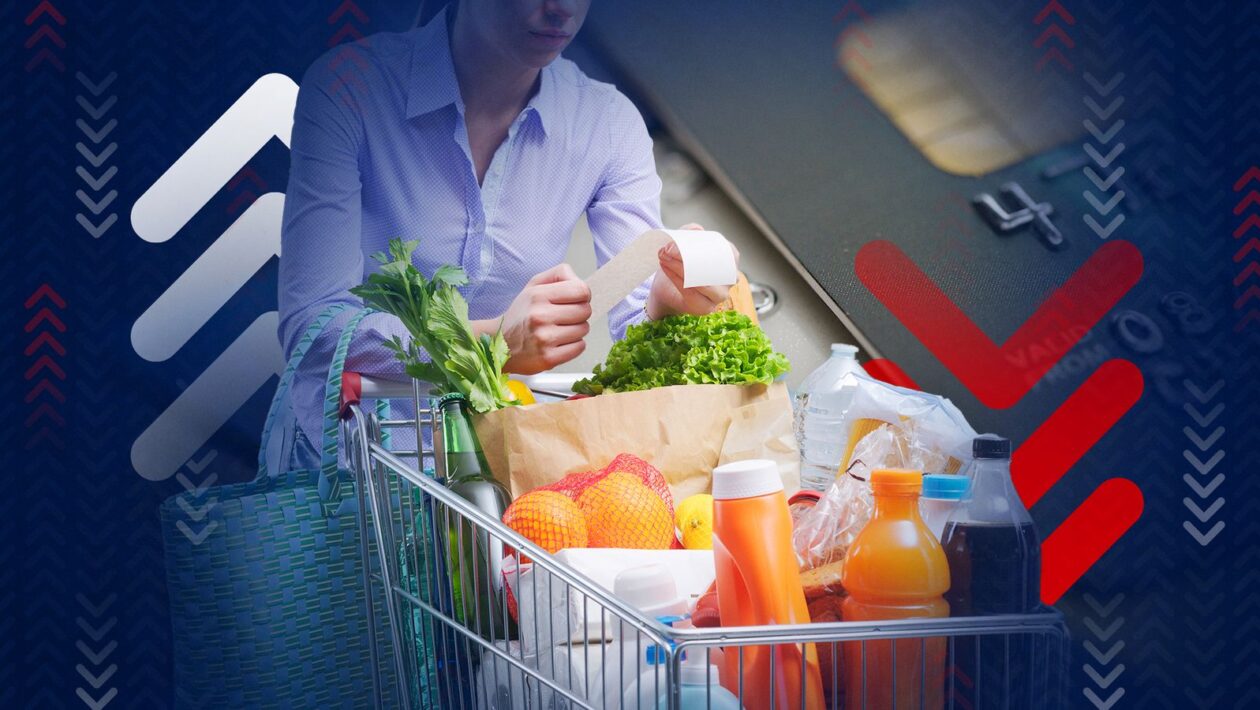[ad_1]

More than a quarter of people have started using their credit cards to buy food and a fifth have borrowed money to adjust to rising prices this year.
Figures from a new poll carried out by Ipsos for Sky News also show that a quarter of people have sold belongings and 24% have skipped meals, while half of people are socialising less.
The number of people potentially building up debt by resorting to credit cards or borrowed money is particularly concerning given rising interest rates.
On Thursday, the Bank of England will announce its first interest rate decision since Liz Truss and Kwasi Kwarteng’s disastrous mini-budget.
Markets are expecting a potential rise of 0.75 percentage points, taking the bank rate to 3%. That would be the highest increase since 1989 and the highest rate since 2008, although the Bank has hinted that markets may be pricing in too high a rise.
Are people missing payments on bills?
More than a third of people say that they have found it difficult to pay their energy bills in the past three months.
Although that figure is a slight increase compared to when the same questions were last asked in August, this month’s poll showed that fewer people are adjusting their behaviour to respond to rising prices than in previous months.
Gideon Skinner, head of politics research in public affairs at Ipsos, said: “The levels of concern peaked in August and have slipped back to figures we were seeing earlier in the year. But it’s important to say that the absolute level is still pretty high.
“We are also seeing that people are now concerned about the whole of the economy more generally, rather than specifically cost of living and inflation. It’s not that people suddenly think everything is going to be fine.”
Mr Skinner said that while levels of concern about the cost of living are high across all walks of life, reflecting how important the issue is, more vulnerable groups are feeling it more intensely.
Younger people, households with children and those with lower incomes are all more likely to say they were “very concerned”, and younger people particularly are most likely to have actually missed payments on bills or set up payment plans.
How many people are hit by rising mortgage rates?
The impact of firstly rising energy prices and then food prices has been felt for months already, but rising housing costs are a more recent pressure and will come in more gradually as people’s fixed mortgage terms expire.
More than a third of people with mortgages say they have already seen their monthly bills rise just in the past three months. That’s more than among private renters and local authority tenants.
Who is to blame?
Almost half of people think decisions made by Ms Truss and the Conservative party’s policies in government have contributed “a great deal” to mortgage rates having increased in the past three months.
That’s significantly more than those who think the state of the global economy, the Russian invasion of Ukraine, Brexit or COVID contributed greatly, although there is clearly some acceptance that each of these issues have still played a part.
Mr Skinner said “people can recognise that there’s lots of different issues at play, global economic factors, the war in Ukraine, for example, but this shows that the Conservatives are being given some of the responsibility and some of the blame too.”
“Labour have the advantage on this. Rishi Sunak is not too far behind, personally, but it’s the wider damage to the Conservative brand that will be concerning him.”
Who do people think can fix the problem?
Although people blame former PM Ms Truss for the recent increase in housing costs, they don’t think that her replacements will help all that much with finding solutions.
Fewer than one in 10 people thought any of the prime minister, the chancellor or the leader of the opposition, Sir Keir Starmer, would have a very positive influence on the cost of living facing Britain over the next six months, while fewer than three in ten thought they would have any kind of positive influence at all.
More than half of people thought consumer champion Martin Lewis – the Money Saving Expert – would have a positive impact.
The question was asked to people between 21 and 23 October, before it was announced that Mr Sunak would be the new prime minister on 24 October.
Mr Skinner said: “You would normally expect a slight improvement in personal ratings after someone is officially announced as prime minister, but the issue is not just about his personal ratings but the wider perception of the Conservative party.
“Labour have recently taken their first lead on the economy for 15 years, for example.”
The government will take some reassurance that more people think Vladimir Putin would have a negative influence on their cost of living than their policies.
Seven in 10 think the Russian leader will be responsible for worsening the cost of living crisis over the next six months, compared to the one third that think the chancellor will.
Methodology
Ipsos interviewed a representative quota sample of 2,111 adults aged 18-75 in Great Britain. Interviews took place online between 21 and 23 October 2022. Data has been weighted to the known offline population proportions. All polls are subject to a wide range of potential sources of error.
Full tables can be found here.
The Data and Forensics team is a multi-skilled unit dedicated to providing transparent journalism from Sky News. We gather, analyse and visualise data to tell data-driven stories. We combine traditional reporting skills with advanced analysis of satellite images, social media and other open source information. Through multimedia storytelling we aim to better explain the world while also showing how our journalism is done.
Why data journalism matters to Sky News
[ad_2]

